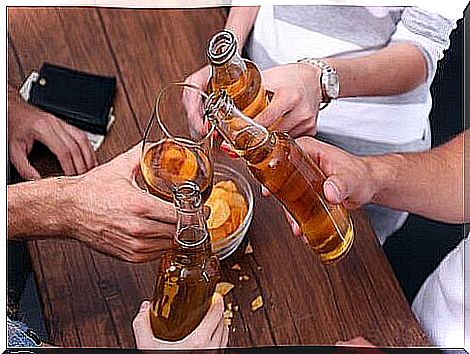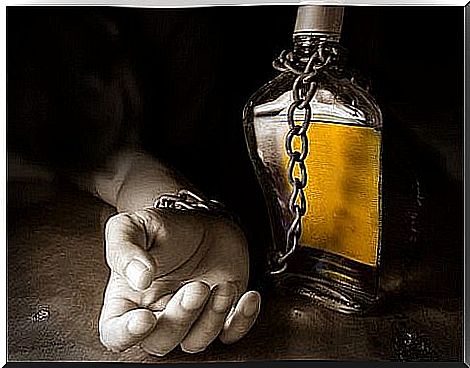The Fine Line Between Alcoholism And A Habit

Today you have left the office and, like every other Friday afternoon, you have agreed to meet some friends for a drink. It’s your tradition, and it’s almost the only way you can keep in touch. But this afternoon it’s different. One of your friends has news that surprises everyone: he has been diagnosed with alcoholism. Furthermore, this habit of meeting every Friday for drinks is part of the problem.
This bomb shocks you and your friends. It makes everyone think it’s a joke. But it is not. It’s a real problem, and unfortunately it’s very common. And it is also very difficult to understand. It’s hard to understand because you also drink. You also go to those gatherings with your friends, and you also participate in this habit. Still, you do not suffer from alcoholism. You are not an alcoholic. Or do you think so…

Alcoholism or a habit?
Diagnostic classifications, such as the DSM-5, define alcohol dependence as “a set of behavioral and physical symptoms, including increasing indifference, developed tolerance, and a strong desire or feeling of compulsion to ingest the substance.”
Within the criteria , they emphasize frequency and recurrent alcohol consumption as an important part of the diagnosis. But, can this repeated consumption be considered a habit? According to Real Academia Española, we will take into account the word’s sixth definition. It defines a habit as “a situation of dependence on certain substances”.
But is it a habit in itself that really generates the addiction ? The answer is no. An addiction, when it comes to alcoholism, is a disease that develops due to various factors. These factors include psychological, social and biological aspects. It goes from a simple habit to an excessive consumption. This consumption in turn changes the cerebral structure and behavior of the individual.
This means that it is a mixture of biological, social and behavioral factors that make a habit something more. It turns a drink with your friends into an addiction. And this is the most dangerous part, there are some factors we control, and some we do not control. This makes it difficult to predict who, if placed in the same situation, will develop an addiction and who will not.

Why do some people develop alcoholism and others do not?
So why is it in the group of friends we mentioned earlier, one who developed alcoholism, and the rest did not? The factors that influence the development of an alcohol dependence can be summarized in:
Biological factors
The biological factors that contribute to the development of alcoholism range from genetic inheritance to alteration of various neurotransmitters and cerebral structures promoted by consumption habits, which in predisposed individuals provide an even faster modification.
Alcohol dependence is more easily found among relatives. 40-60% of the variance in the risk of suffering from alcoholism can be explained by genetic influences. In addition, the risk is three to four times as high for children of people with the disorder.
Regarding cerebral functions and neurotransmitters, dopamine has been shown to be involved in the onset of addiction. This is because dopamine is associated with pleasure, as well as the so-called cerebral reward system, which consists mainly of the ventral tegmental area, among other structures.

Psychological factors
The individual’s perception of alcohol consumption and the use he gives it can be very important. If the person who developed alcoholism in the group of friends we mentioned earlier tended to boast of being the one who could tolerate drinking the most, he probably drank much more than his friends.
Besides endangering its own health by generating a harmful habit, it ceased to be controllable and became an addiction. Thus, their patterns of behavior during adolescence, which is when this type of behavior begins, are crucial. Their attitude to control and devaluation of the need for social validation is very important.
Social factors
The perception of drinking and the availability of alcohol in the society in which the individual is located are also very important factors. It has been shown that societies that are more liberal regarding alcohol consumption have higher alcohol levels.
Because of all this, we must point out that there is a very fine line between a habit and alcoholism. In this line, there are factors within our control (behavior) and others that are not (biological risks). Thus, you need to be very careful and always consume alcohol in moderation. Or, even better, avoid consumption altogether.









